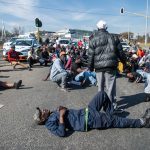Alex has always been a place of contention beyond politics
Protests by #AlexShutdown are the latest in the long history of challenging black exclusion in Alexandra, which from very early in its existence became a place of black resistance.
Author:
31 July 2019

A woman wearing a black top bearing the words “Total #AlexShutdown” lays out both her Form Cs in front of the policemen standing guard at the entrance to the local government offices. The form in question proves a resident has applied for housing and is registered on the housing waiting list. Having applied for a house twice, she wails that she is still unable to get a job or house.
Some people who have been living in Alexandra for as long as 50 years have still not received houses. This is in part because of corruption and the replacement of the C-list with the Housing Demand Database.
Following protests and a shutdown about the continuing neglect and dire socioeconomic conditions in Alexandra, the South African Human Rights Commission (SAHRC) Alexandra inquiry was set up to investigate any human rights violations, as well as corruption and maladministration.
#AlexShutdown’s convenor Sandile Mavundla told New Frame that this grievance was part of the broader complaints voiced by residents in the township’s second protest since April. They were objecting to a lack of adequate housing and infrastructure, uncollected rubbish, overcrowding and high levels of crime.
Gauteng member of the executive council for education Panyaza Lesufi submitted to the Alex inquiry that the first thing to be disrupted during protests was schooling, adding that a total of eight school days were missed during the protests staged in Alex during April.
Related article:
Historian Noor Nieftagodien, who co-authored a comprehensive history of Alexandra in 2009, said “the replacement of the C-list with block developments was disastrous, no matter how good the intentions were, similar to the RDP process.” He added that Alex is constantly overcrowded and the government is constantly playing catch up.
Obed Bapela, deputy minister of Cooperative Governance and Traditional Affairs (COGTA), who also grew up in Alex, echoed Gauteng member of the executive council for human settlements Lebogang Maile’s point that Alex faces the challenge of rapid urbanisation, and an ever-increasing population because of migration to the city for jobs.
“They don’t wait for settlements to be developed,” Bapela said in his appeal to residents to stop building houses, because they will not be compensated for unlawful structures.
Although Maile argued that land occupations were illegal, EFF Gauteng leader Mandisa Mashego had argued previously at the inquiry that land occupations are an EFF programme based on need, not luxury. She said they are “based on hunger for land that exists, we didn’t create that hunger … we are not to be blamed for that hunger”. She added that they have been demanding since 2014 that suitable homes are found for the people of Alex.
Alexandra Renewal Project
The inquiry will also attempt to hold to account those who led the Alexandra Renewal Project (ARP), launched by former president Thabo Mbeki in 2001, because although about 14 000 housing units were built and a few upgrades made, in 18 years only a few Alexandra residents have benefited.
The ARP was allegedly closed down owing to implementation problems, with a number of projects not taking off or not being completed in their allotted time. The far-reaching project was aimed at addressing urbanisation and housing issues. Former Joburg mayor Parks Tau had argued that a forensic audit into maladministration and corruption by the auditor general came back clean.
According to Maile, money has never been improperly misspent on the project, and there are products of the project which have benefited the people of Alex.
Related article:
Speaking in the township on 23 June, Maile explained that the R1.3-billion estimated budget for the project — which was due to be rolled out over seven years and gradually increased to R2.2-billion — was never a ring-fenced amount with a particular official responsible for it.
It’s not the first time a plan to renew the township has been proposed and failed. The urban renewal plan was introduced by the government and in 1982, Alex was declared a residential area. Following displacement caused by demolitions, as well as the lack of suitable capacity to maintain the infrastructure, the plan was canned in 1990.
That was not to be the only project. In 1998, R3-billion was poured into building three-storey blocks that would house 3 000 people in yet another plan to develop the township.
The project found itself inundated with requests for pre-emptive court orders to protect developments from invasions by political groups and orchestrated marches, according to a 2008 Treasury report.
On 26 July, the auditor general submitted that they could not conclude that the R1.3-billion or projected R2.2-billion expenditure was exclusively used for the ARP because there was a lack of basic documentation such as original plans, supporting documents and contracts.
The Chapter Nine institution’s audit procedures were limited to electrification and a few building projects, but documentation was not supplied. They were also unable to determine and audit the true costs of water and sanitation, roads and stormwater projects, as well as the procurement process of the human settlements department.
“There was poor project planning and a lack of documentation to assess the planning of the project. In addition, the individual projects within the ARP were not effectively implemented and monitored,” read the report.
Alex’s violent history
Alex has a history of violence manifesting in protests, killings pre-democracy and dangerous gangs known to throw their unsuspecting victims into the Jukskei River.
Formally recognised as a so-called “native and coloured” township in 1912 – 16 years after the establishment of Johannesburg as a formal town – Alex had a social and economic life before. Not only did it connect Pretoria and Johannesburg, it existed as a peri-urban, almost rural, trading spot with a host of farms and fruit markets. There was no forethought at the time that the city would extend north beyond where Parktown currently sits.
Nieftagodien told New Frame that the demand for land by people who were moving in because of increases in urbanisation, industrialisation and mining, meant it was in the commercial interests of the former owners of the land, the Papenfus family, to sell the land to black Africans and people classified as “coloured” under the apartheid system.
Related article:
Nieftagodien claims that the formal recognition of the township is important because, he explained, the family “knew that the government was due to promulgate the 1913 Land Act, the essence of which was to deny black people the right to own land in areas designated as whites only”.
At the time, Alex was a freehold town – a town offering black Africans and those classified as “coloured” under the apartheid system the ability to own land and what they built on it in urban areas.
“Their sense of permanence in the area was significantly different from the majority of black Africans living in Johannesburg, because at the time they were single male migrants working on the gold mines but they were living in compounds,” he said.
As far back as the 1930s, there were futile attempts to remove Alex and its residents. However, the people staked a claim and defiantly remained. By the 1950s, black Africans were moved to designated areas following the promulgation of the Group Areas Act and the Native Urban Areas Act of 1952. Even those living in mixed-race areas were moved, and their homes destroyed in a process that reversed land ownership violently and forcefully or compensated very little for it.
Alex was the main labour reservoir in the northern suburbs that expanded to neighbour Alex closely, and as the bus boycott of the 1940s demonstrated, thousands of black African workers travelled daily down Louis Botha Avenue to go to work. Nieftagodien says Alex and Soweto became the working class hubs of Johannesburg, which made it difficult to move people from there.
Focal point of resistance
In the context of black exclusion that was constantly challenged in Alex, the township’s urbanised and working-class character and sense of permanence through freehold, meant quite early on Alex became a place of black resistance.
Nieftagodien explained: “Having that right is a highly political right, defending that right is profoundly political and profoundly radical and so it’s not accidental that Alex becomes a place where people want to go to.”
He adds that it became a place of contention that went beyond just formal politics. “When you come to Johannesburg, you don’t go to Soweto, it’s a municipal location and the kind of surveillance of the state earlier on is greater in Soweto because you don’t have the municipality, you have the health committee and peri-urban police,” he said.
It appears that even years later, Alex is still a place many run to, in order to escape surveillance as it is host to people of different nationalities with different backgrounds.
Related article:
In the early 1960s, a plan was proposed to convert Alex from a freehold township into a hostel township, and some 60 000 people were moved out of the area. That allowed Tembisa, east of Johannesburg, established in 1957, and Meadowlands, south of Johannesburg, established in the early 1950s, to burgeon.
Nieftagodien said the political tendencies in Alex reflect both its history and the contemporary political landscape in South Africa, “but there has also been a fragmentation of movements and the fragmentation has not always occurred on ideological lines”.
He argued that a history of political contestation in the midst of poverty exists and will continue, but making sense of the different political machinations is difficult.
“The fragmentation which is largely not on ideological lines is quite localised which means people respond to immediate issues rather than having a broader vision, politics or ideology, which distinguishes them in a particular way,” he said.
The nickname of Dark City for Alex was born out of the darkness the township plunged into nightly because for many years it had no electricity or water reticulation. The name did not stick; towards the end of the 1970s, electricity was slowly introduced in the area, rendering the moniker redundant.
Although there are many different theories about the origins of the name Alexandra, Nieftagodien said there is no definitive answer. Some say it is the name of an English princess, and others say it is the name of a woman with whom Papenfus had an affair.
“It’s unclear … but I think it adds to the mystery … we can only speculate … People from Alex are content with the name, there’s never been any question about changing the name. The street names have been changed, but the township itself … people have kind of left it,” he said.





